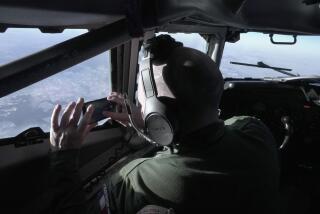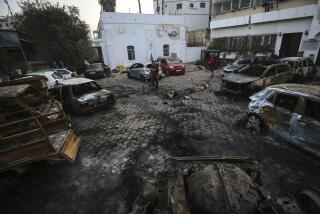Bomb Suspected in Crash of French Plane in Africa
- Share via
PARIS — A French DC-10 jetliner with 171 people aboard experienced a powerful high-altitude explosion, possibly from a terrorist bomb, before crashing in a remote desert region of Niger in northern Africa, officials in France said Wednesday.
In Washington, intelligence specialists said they believe that the jetliner may have been bombed by people seeking to retaliate against France for its recent actions in Lebanon.
For several months, France has played an active part in the Lebanon crisis, attempting to broker a settlement between Christian and pro-Syrian forces.
Late last month, the French government sent a naval task force of five warships into Lebanese waters as part of what President Francois Mitterrand called a “rescue mission” for several thousand French nationals living in the war-torn country. But the action was widely perceived as an attempt to provide protection and support for Maj. Gen. Michel Aoun and his Maronite Christian forces against Syrian troops and Muslim militias in Lebanon.
Ever since, one intelligence official said Wednesday, the French government has realized that its planes were being targeted for some sort of terrorist attack.
The DC-10 operated by the French airline UTA crashed Tuesday after taking off from N’Djamena, Chad, on a flight that originated in Brazzaville, Congo. French military helicopter crews who visited the crash site in the desolate reaches of the Sahara Desert late Wednesday afternoon found no survivors. Included among the presumed dead was the wife of the American ambassador to Chad.
On Wednesday, Michel Friess, a spokesman for UTA, said that “the wide surface over which the debris of the airplane has been found suggests a high-altitude explosion that leads one to think of a criminal attack.”
Anonymous callers to the airline office in Paris and to a Western news agency in London claimed responsibility for the crash on behalf of the Shiite Muslim terrorist organization Islamic Jihad.
The London caller linked the attack to the seizure of a Shiite cleric, Sheik Abdel Karim Obeid, by Israeli forces in southern Lebanon on July 28.
Saying he was reading a statement from Islamic Jihad, the London caller declared: “We are proud of this action, which was very successful. We would like to say the French are warned not to exchange information regarding Sheik Obeid with the Israelis no more. We demand the freedom of Sheik Obeid, and otherwise we will refresh the memories of the bombings in Paris of ’85 and ’86. Long live the Islamic Republic of Iran.”
However, the message made little sense in the context of France’s limited role in the Obeid matter.
A more likely possibility, speculated terrorist experts and one intelligence source in Washington, was a terrorist attack on behalf of pro-Syrian Muslim forces in Lebanon.
The French Foreign Ministry declined to comment Wednesday about the possibility of a terrorist attack. “The pieces are widely scattered, so it didn’t crash on impact,” a Foreign Ministry spokesman said.
Air controllers lost contact with UTA Flight 772 less than an hour after it took off from N’Djamena. The sudden loss of contact was another explanation given by the French airline authorities supporting the theory of a terrorist explosion.
“If there had been a very serious problem on board, other than an explosion or the sudden disintegration of the airplane,” said UTA spokesman Friess, “there would have been at least several seconds or minutes for the crew to re-establish contact.”
UTA officials insisted that the DC-10 was in good working condition, having completed 60,000 hours of flying time on 14,700 flights in 16 years of service. Since it was formed in 1949, UTA, which specializes in African and Pacific routes, had never experienced a crash during a commercial flight.
However, in 1984 a UTA DC-8 aircraft flying the same route was damaged by a bomb explosion before takeoff at the N’Djamena airport. Twenty-five people on board were injured in that attack, which the Chadian government blamed on Libya. Chad-Libyan relations have recently normalized after a 10-year guerrilla war.
At the White House, Press Secretary Marlin Fitzwater said the U.S. government’s information on Tuesday’s disaster was limited.
“We can’t at this time state for a fact that (the plane) was blown up, but it does have those appearances,” he said.
In Santa Monica, a RAND Corp. analyst, Bruce Hoffman, said Wednesday he believed the attack was probably staged by Shiite Muslim groups concerned that France might intervene in Lebanon on behalf of the Maronite Christians led by Aoun.
“It seems to me that there’s a much stronger Middle Eastern context than an African context,” Hoffman said. “It could be that the Maronites’ opponents in general were determined to deliver some sort of a knockout blow in Lebanon, and (it) was designed as a warning to make the French think twice.
“This would send a pretty clear message to France that they ought to back away,” Hoffman added. He noted that by the end of August, “all the main Shiite players in Lebanon had threatened some sort of retribution against France.”
Threats by Militants
On Aug. 20, the Revolutionary Justice Organization threatened to “strike deep into the heart of French territory.” Three days later, Hezbollah threatened to stage suicide attacks against French targets. On Aug. 25, a previously unknown group, the Organization in Defense of the Oppressed, threatened to strike “at French interests everywhere.”
An Air France flight on Aug. 28 was delayed for more than five hours before taking off from Dulles International Airport in Washington when security officials received a last-minute bomb threat. According to one well-informed intelligence official, both French and American officials took that threat seriously and searched all the luggage on the plane before allowing it to depart.
While France’s willingness to bargain with terrorists for the freedom of hostages had in the past created a modus vivendi that appeared to spare the country from violent attacks, Hoffman and other analysts suggested that the stakes in Lebanon had become too important for those old rules to apply.
“In these people’s eyes, we’re really talking about Lebanon’s future. That wrenches the entire struggle in Lebanon onto a higher plateau,” Hoffman said. “The last battle for Beirut has yet to be fought.”
“If it’s not the beginning of the end of things there, it’s certainly the opening of a new wave of conflicts there,” agreed another analyst, Jim Blackwell of Georgetown University’s Center for Strategic and International Studies.
Another analyst at the center, Robert Kupperman, discounted the possibility that a small terrorist group alone could have been responsible for the airborne bombing.
“When someone puts a bomb on the plane, it normally takes the resources of a state, at least to set it up,” Kupperman said.
Apart from Syrian-backed Lebanese forces, Kupperman suggested that Libya and Iran also could have been motivated to stage such an attack.
According to intelligence specialists, security at the airport in Chad at which the plane stopped is under the control of French officials. However, the French do not control airport security in Brazzaville, the city from which the plane took off.
The waiting room at Paris’ Charles De Gaulle Airport, where the flight was scheduled to land, was tense and somber after the plane was first reported missing Tuesday night.
Included among the passengers was Bonnie Pugh, wife of the U.S. ambassador to Chad, Robert L. Pugh. The State Department said six other Americans were aboard.
Mrs. Pugh was on her way to the United States for her daughter’s wedding, according to her sister, Sally Johnson, of Brawley, Calif. The ambassador’s wife, who was born in Los Angeles in the 1920s and later moved to the Imperial Valley, had decided to travel ahead of her husband to help plan the October wedding of their 26-year-old daughter Anne in suburban Washington, D.C.
Another passenger aboard the plane was Chadian Planning Minister Mahamat Soumaila, en route to Washington to attend a meeting of the International Monetary Fund.
Most of the passengers were African. French officials said the victims included 31 Frenchpassengers.
Tempest reported from Paris and Mann from Washington. Times staff writer Douglas Jehl, in Washington, contributed to this story.
More to Read
Sign up for Essential California
The most important California stories and recommendations in your inbox every morning.
You may occasionally receive promotional content from the Los Angeles Times.










